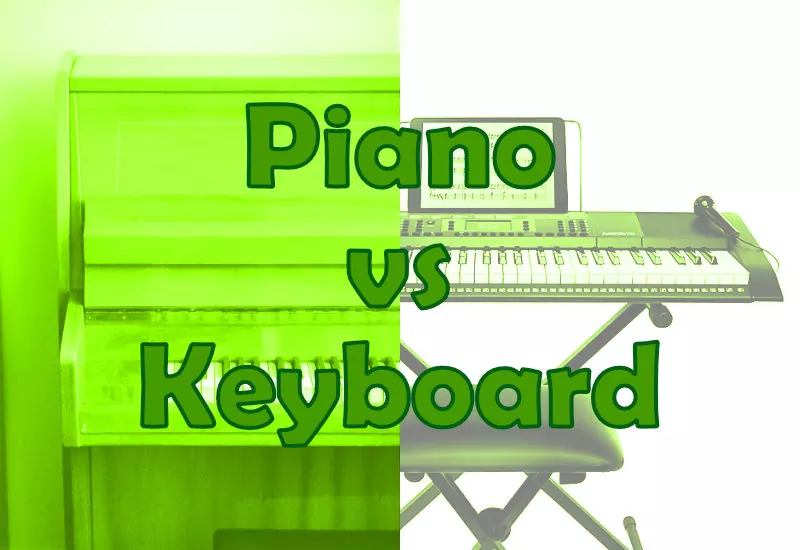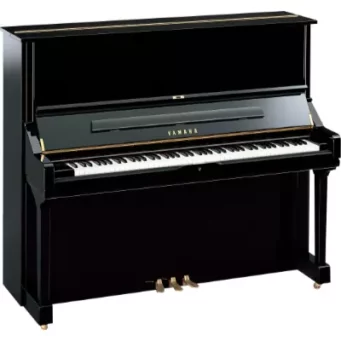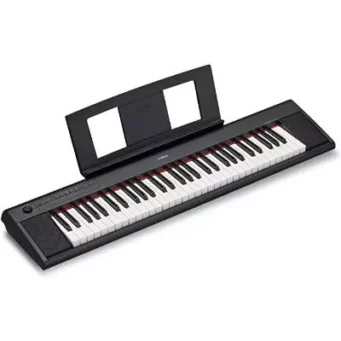Piano vs Keyboard

Contents
The difference between piano and keyboard

Photo courtesy of Yamaha
Pianos are acoustic instruments with weighted keys, whereas keyboards are electric instruments (requiring electricity) with unweighted (lighter) keys. Each instrument has its own unique benefits and features.
Weighted keys on a piano, for example, can build up finger strength, which enhances your playing technique. And when you play notes on a piano, the enharmonics (when neighboring piano strings vibrate as one) create a sound that is uniquely piano-like. But this comes at a price: In order to achieve better sound quality, the acoustic piano comes with a bulky sound body, which typically consumes much more space than a keyboard.
Tuning a piano regularly can be expensive, however. On the other hand, keyboards don’t require tuning. A keyboard allows you to change the sounds and instruments, which makes practicing a lot more fun (many keyboards offer hundreds of different sounds). Pianos, however, usually produce better sound quality than keyboards and so sound less “artificial” as the pianist can control (such as the volume) better with weighted keys.
Playing along with backing tracks is possible on a keyboard. Performing on a keyboard also encourages very precise playing. While playing the piano, you can occasionally clip an incorrect note more easily than you can when playing on a keyboard. You can also improve your timekeeping skills by playing with backing tracks. Additionally, MIDI keyboards can be connected to computers and iPads, which can be used to create music.
What are piano weighted keys?
Digital pianos have a feature called “weighted keys” that mimic the action of an acoustic piano. When a key is pressed on an acoustic grand piano, a series of mechanical parts are set in motion to throw a hammer at the strings. Essentially, this produces the familiar sound of a piano and provides a pianist with the control they need to produce an array of expressive possibilities.
Is a keyboard the same as a piano?
The answer, as usual, is that it depends on which side you look at. Let me explain:
To keep things simple, a “keyboard” has unweighted keys and is portable. The correct term for an electric keyboard instrument that has weighted keys is a “digital piano”.
Now this just introduced a new category of pianos/keyboards. We have:
- Acoustic pianos
- Digital pianos
- Keyboards
Whereas the digital piano and keyboard are grouped into the term “electric piano/keyboard” or “MIDI keyboard”. MIDI keyboards are all MIDI instruments with a piano-style keyboard, including both keyboards (without weighted keys) and digital pianos (with weighted keys) – as long as the instrument has MIDI capabilities.
Another notable difference between a keyboard and digital piano is the quality of build and feel overall. Typically, keyboards are cheaper, not just in price but also in the way the piano feels when playing. The keys for example feel “plasticky” whereas weighted keys almost feel like old school grand piano material.
What about electric piano vs keyboard?
For starters, a keyboard is always electric, be it by an electric inlet or batteries. As the title suggests, an electric piano requires the exact same energy sources. The difference though lies in the type of piano keys being used: an electric piano uses weighted keys whereas an electric keyboard (or just short: keyboard) doesn’t. The term “electric piano” is rather unusual though and you should just be using the term which is widely used: digital piano. Thus, the title above should rather be:
Digital piano vs keyboard
As explained above, both are electric in order to even be able to “sound” but the digital piano has weighted keys, feels more piano-like and is “less portable”.
Conclusion
As a pianist myself, I encourage you strongly to look into the class of digital pianos when choosing such an instrument for your child. They use less space, are easier to maintain and significantly more economic than an acoustic piano. On top of that, digital pianos allow best for the “real experience” of a traditional piano by offering weighted keys and sometimes better sound quality than keyboards. If interested, I wrote an article about which best digital piano to choose for your child.
If you are unsure if your child will enjoy the piano and “stick with it”, I suggest going for a keyboard such as the Yamaha NP12 simply because they are the most affordable of all piano-like instruments. You can always upgrade later. However, truth be told, no more than 1 year later, IMHO. This gives you plenty of time to observe if your child continues to show progress but also limits the exposure to non-weighted keys. After all, you want to properly train your little one as soon as possible.
Parents, Teachers & Sheet Music Seekers:
If I offered to provide you hundreds of legit sheet music PDFs for your kids:
- Brand-New & Exclusive Compositions
- Age & Level Appropriate
- With INSTANT Online Access
- Worry-FREE Licensing & Copyright
...would you take me up on that offer?
ABOUT
I started Music4Kids with a simple goal in mind: To provide valuable information to guiding parents who want to raise musically inclined kids.
Click to read on
